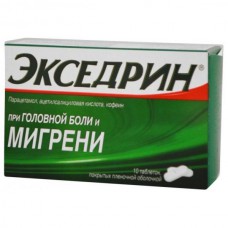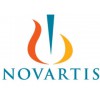Expiration date: 02/2026
Release form
Tablets, film-coated
Composition
1 tablet contains paracetamol 250 mg, acetylsalicylic acid 250 mg, caffeine 65 mg
Packaging
10 or 20 PCs
Pharmacological action
Excedrin is a combination drug containing paracetamol, acetylsalicylic acid and caffeine.
Paracetamol has analgesic, antipyretic and extremely weak anti-inflammatory effect because of its influence on the thermoregulation center in the hypothalamus and weakly expressed ability to inhibit the synthesis of prostaglandins in peripheral tissues.
Acetylsalicylic acid has analgesic, antipyretic and anti-inflammatory action. Quickly reduces pain, especially caused by inflammation, as well as moderately inhibits platelet aggregation and slows down the process of clot formation, improves microcirculation in the inflammation.
Caffeine increases the reflex excitability of the spinal cord, stimulates the respiratory and vasomotor centers, dilates blood vessels in skeletal muscle, brain, heart, kidney, reduces platelet aggregation. Reduces drowsiness, fatigue, enhances mental and physical performance. In this combination the caffeine in a small dose almost has no stimulating action on the Central nervous system, however, contributes to the normalization of tone of cerebral vessels and acceleration of blood flow in it.
Testimony
Pain syndrome of mild and medium intensity of different origin: headache, migraine, toothache, neuralgia, arthralgia and myalgia (pain in muscles and joints), algomenorrhea (pain during menstruation).
Contraindications
Hypersensitivity to any component of the drug Excedrin, erosivno-azwenne shock syndrome in acute phase, gastro-intestinal bleeding, full or partial combination of bronchial asthma, retidivirutego of polypose of the nose and paranasal sinuses and intolerance of acetylsalicylic acid or other nonsteroidal anti-inflammatory drugs (including in history), surgical intervention, accompanied by hemorrhage, hemophilia, hemorrhagic diathesis, hypoprothrombinemia, severe hypertension, portal hypertension, severe coronary artery disease, glaucoma, vitamin K, renal insufficiency, concomitant use of other drugs containing paracetamol, acetylsalicylic acid or other nonsteroidal anti-inflammatory agent, the deficit glukozo-6-fosfatdegidrogenaza, pregnancy, lactation, anxiety, sleep disorders, children up to age 15 years (risk of Reye's syndrome in children with hyperthermia on a background of viral diseases).
With caution. Gout, liver disease, headaches associated with head trauma, anticoagulants, hypoglycemic agents, gout or arthritis, and concomitant use of drugs containing acetylsalicylic acid or other painkillers and antipyretic components.
Application of pregnancy and breastfeeding
Despite the fact that acetylsalicylic acid can be used in the second trimester of pregnancy, the safety of this combination in pregnant and breastfeeding have not been studied, therefore the drug is contraindicated in pregnant women (in all trimesters) and breast feeding.
Method of application and doses
Excedrin drug is taken orally during or after meals.
Adults and adolescents 15 years of age: 1 tablet every 4-6 hours
At the first sign of a migraine headache, take 2 tablets.
Average daily dose is 3-4 tablets per day, maximum daily dose of 6 tablets per day.
After taking 2 tablets headache relief and other pain usually comes on quickly - in 15 minutes migraine relief usually comes within 30 min.
In case of pain syndrome, the drug should not be taken more than 5 days without consulting a doctor. ANTIMIGRAINE medication should not take more than 3 days without consulting a doctor.
Side effects
Gastralgia, nausea, vomiting, hepatotoxicity, nephrotoxicity, roseweasley lesions of the gastrointestinal tract, allergic reactions, tachycardia, increased blood pressure, bronchospasm. With prolonged use - dizziness, headache, blurred vision, tinnitus, decrease platelet aggregation, hypocoagulation, hemorrhagic syndrome (nosebleeds, bleeding gums, purpura, etc.), damage to the kidneys with papillary necrosis, deafness, malignant exudative erythema (Stevens-Johnson syndrome), toxic epidermal necrolysis (Lyell's syndrome), Reye's syndrome in children (or hyperpyrexia, metabolic acidosis, abnormalities of the nervous system and psyche, vomiting, liver function abnormalities).
Special instructions
If after taking the drug the symptoms persist, there is a deterioration or there are new symptoms, you should immediately consult a doctor. While taking the drug at the recommended dose in the body receives the same amount of caffeine as is contained in a single Cup of coffee, so you should reduce the consumption of caffeinated products in the treatment of this drug in order to prevent the development of the nervous excitation, irritability, insomnia and palpitations amid the overdose of caffeine. If you suspect an overdose you should immediately seek medical help, even if symptoms are absent. You should refrain from alcohol while taking the drug in increasing the risk of liver damage and gastrointestinal bleeding. Since aspirin slows blood clotting, the patient to surgery, must inform the doctor about the drug. Acetylsalicylic acid in low doses reduce uric acid excretion, therefore patients with a predisposition to drug can cause an attack of gout. Prolonged use of the drug requires monitoring of peripheral blood and functional state of the liver.
Effects on ability to drive vehicles and operate machinery. Not been reported on the influence of the drug on the ability to drive and use machines.
Drug interactions
The drug may potentiate the action of heparin and indirect coagulants, reserpine, steroid hormones and hypoglycemic) drugs.
Concurrent use with other nonsteroidal anti-inflammatory drugs, methotrexate increases the risk of side effects. Reduces the effectiveness of spironolactone, furosemide, antihypertensive drugs, and protivopodagricakih drugs that promote the excretion of uric acid. Barbiturates, rifampicin, salicylamide, antiepileptic drugs and other inducers of microsomal liver enzymes contribute to the formation of toxic metabolites of paracetamol that affect liver function. Metoclopramide accelerates the absorption of paracetamol. Under the influence of paracetamol half-life of chloramphenicol has increased 5 times. In repeated dose acetaminophen may increase the effects of anticoagulants (coumarin derivatives).
Simultaneous treatment with paracetamol, acetylsalicylic acid and alcoholic beverages increases the risk of hepatotoxic effects. Caffeine speeds up the absorption of ergotamine.
Overdose
The symptoms are due to the presence of acetaminophen (when taken in doses of more than 10-15 g/day): during the first 24 h pallor, nausea, vomiting, anorexia, abdominal pain, impaired glucose metabolism, metabolic acidosis. Symptoms of liver function abnormalities can occur after 12-48 h after overdose. In severe overdose-hepatic failure with advanced encephalopathy, coma, death, acute renal failure with tubular necrosis (including in the absence of severe liver disease), arrhythmia, pancreatitis. Hepato-toxic effects in adults manifests itself when taking 10 g or more. The symptoms are due to the presence of acetylsalicylic acid (when used in doses more than 150 mg/kg): for mild intoxication - nausea, vomiting, tinnitus, blurred vision, dizziness, severe headache. In severe poisoning - hyperventilation Central Genesis (shortness of breath, dyspnea, cyanosis, cold clammy sweat, respiratory paralysis), the respiratory acidosis. The greatest risk of chronic intoxication is seen in children and the elderly when taken in the course of a few days more than 100 mg/kg/day. If poisoning moderate to severe requiring hospitalization.
The symptoms are due to the presence of caffeine (when taken in doses over 300 mg/day): gastralgia, agitation, anxiety, excitement, restlessness, confusion, delirium, dehydration, tachycardia, arrhythmia, hyperthermia, frequent urination, headache, increased tactile and pain sensitivity, tremor or muscular twitching, nausea and vomiting, sometimes with blood ringing in the ears, seizures (acute overdose - tonic-clonic). Treatment: control of acid-basic status and electrolyte balance. Depending on the state of metabolism - the introduction of sodium bicarbonate, sodium citrate or sodium lactate. Increasing alkalinity increases the excretion of acetylsalicylic acid by alkalizing urine. Gastric lavage within the first 4 h, provocation of vomiting, administration of activated charcoal, laxative medicines, the introduction of aid donors SH-groups and precursors of glutathione synthesis methionine for 8-9 hours after the overdose and acetylcysteine is within 8 hours.
Storage conditions
At temperatures above 25°C. Keep out of reach of children.



